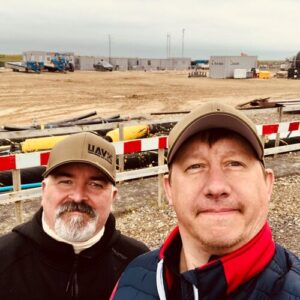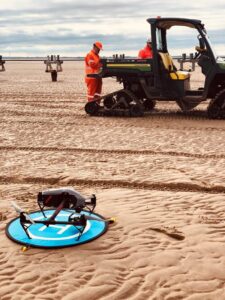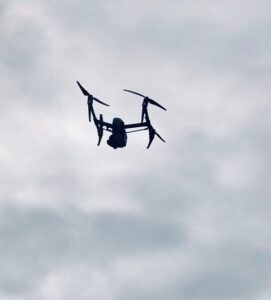Following an extensive career in military drone use, Stu Logan and business partner Tom Hubbard launched Unmanned Air Veterans Ltd. Working on a range of projects, from film shoots, to construction, to warehouse inspection, Stu is working to connect with other veterans and improve drone education and perception.
 What is Unmanned Air Veterans’ mission?
What is Unmanned Air Veterans’ mission?
Our mission – as corny as it sounds – is to be the best that there can be. We are a drone service offering creative media, inspection, analytical work, and movie/TV work. We also run an online group to connect with other veterans involved in drones, so we can talk and share ideas. There are a few of us, all involved in different areas of the industry, and as our business grows, we’re keen to get more involved in the education and training side also.
How did you get involved in drones?
Both myself and Tom served in what was the premier drone regiment in the world. When I joined, the kit was basic, nothing was in real time and there were no live feeds – then as technology improved, I was involved with all sorts of trials and the use of more and more semi-autonomous kit. It was a very colourful, entertaining, and challenging twenty years, and when I finished my service I thought – right, that’s what I’m going to do. Although we served in the same regiment, Tom and I were in different units, so we didn’t know each other too well. It wasn’t until we got out and we bumped into each other by chance. A guy I played football with happened to be working with Tom, so I knew he was in the area, and then a week later while I was out walking the dog, I ran into him taking his daughter to work. We haven’t looked back since
What kind of work are you involved in?
It’s been really varied. Ten years ago or so, you started seeing aerial shots with drones on TV, Film and music videos, the nice stuff. Then on sports, especially golf. Mainly because it’s cheaper than getting a helicopter. I think we had this idea that we’d film loads of golf courses in the UK – and we have done some golf courses – but the industry has changed so much in the last few years that we’re having to adapt all the time. Transport of goods and warehouse work (virtual tours) are two areas we’re starting to see more and more interest in. Construction and mapping are growing really quickly too. I would say that movie work is where we’ve personally been quite lucky, and is something we can really get into and there are projects on the horizon for us. Our first job was actually for an indie horror flick, and working on that was a real “pinch yourself” moment. Note: You can see the trailer for KARLI here: https://youtu.be/k2z9dK5SBXU
 How does commercial work with drones differ from military operations?
How does commercial work with drones differ from military operations?
I would say the biggest challenge is not necessarily about finding or doing the work, it’s more about the restrictions that we didn’t used to have. We always operated on a “get that done yesterday, do this now” kind of approach, everything’s very quick, whereas now we have to wait around to do jobs. We can get itchy feet while waiting!
How can drones help veterans?
When you transition out of the forces, you can feel like there’s something missing – a kind of sense of self-worth, of being a part of something. We have both gone through our own channels to get help with diagnosed PTSD, but we found that doing something that you really enjoy for a business, having something to focus on, it really helps with that feeling of self-worth. It’s important to give that opportunity to people like myself and Tom who struggled with the transition, and helping people in similar situations lets us give something back to society.
You mentioned education and training. Can you tell me a bit more?
We’ve been invited to local schools to do open days. We did an event with an SEN (Special Educational Needs) school. Some of the teenagers had severe ADHD, Asperger’s, and other learning difficulties, but they were really interested. There was one young lad who came to see the kit, and his carer came up to me after and said – this is the longest I’ve seen him static, doing something and fully engaged – and the feedback was really good. In the future, we want to introduce drones properly to GCSE-age students and to show that this could be a real career route, to encourage work experience opportunities. Longer term, we would love to offer training courses so people can really get to learn all the skills you need to be a drone pilot. I have an idea for this, hopefully in the next 5 years it will happen.
 What are your hopes for the future of the industry?
What are your hopes for the future of the industry?
I would like the negative stigma associated with drones to go away. I want people to not be afraid of the industry. People worry over safety, the invasion of privacy, flying over peoples’ gardens and that kind of thing, which is understandable. I think to get there, we need to see a mix of community engagement, hearts and minds, and also more clamping down on people that are being irresponsible. There needs to be some clarity on who to speak to if there is an incident, who is going to enforce the laws. It will make people feel a lot safer. We in the industry also need to be out there making videos and using social media to help the public see what’s going on. I love sharing positive news about drones, and it’s important to show people outside the industry that drones are being used for good.
Marketing Manager at DronePrep and recent returnee to the UK after a long stint abroad. Rookie drone pilot, avid writer and lover of all things tech.
